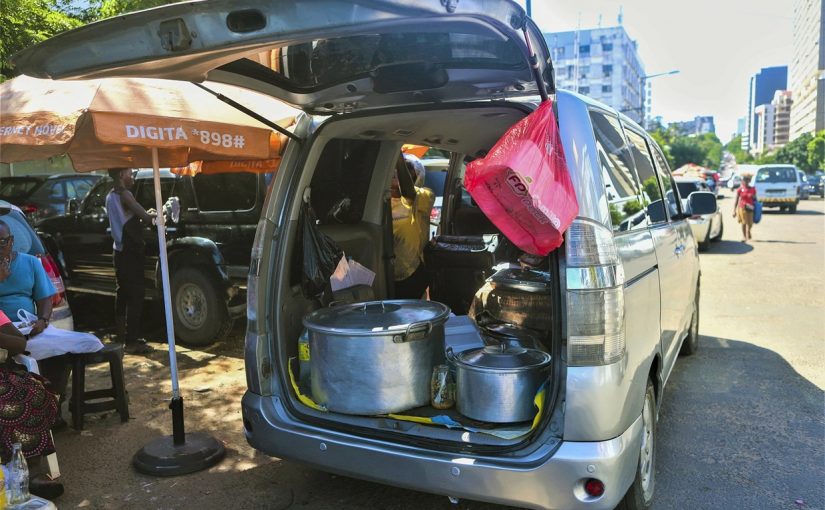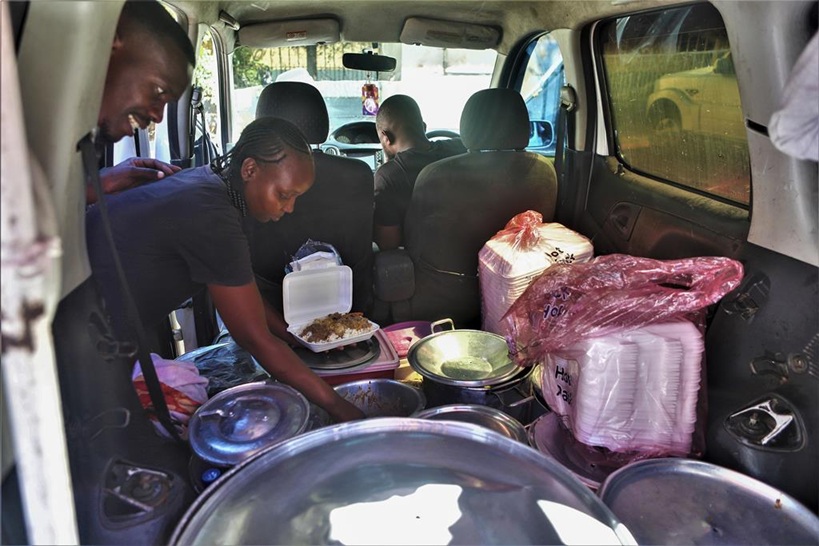Mozambique: Government promises more business-friendly legislation
Food served from the trunk of a car feeds families in Maputo

Photo: Lusa
They arrive early in the morning, park their cars in the central streets of Maputo and, with their trunks open, informal vendors earn a living by serving meals on the street at bargain prices.
Wearing a cap on his head and an umbrella set up next to his trunk to protect his customers and his food, Faruk Matsinhe, 30, parks his car on Avenida 25 de Setembro in downtown Maputo every morning.
A routine that has been the same for over 15 years, when he inherited his father’s business after his death, selling feijoada and “good national vegetables” for 100 meticais (€1.45). The customers are those who work nearby, many also in informal street businesses, and who are looking for quick and cheap food.
“We learned from my father, we gained experience. When, unfortunately, my father lost his life, we continued the work,” Faruk told Lusa.
The food piled up in the car was made at home, in the suburbs of the capital, and the inside of the open trunk is used for the final preparation, before serving to customers.
Faruk is one of the more than 13.4 million Mozambicans, around 430,000 in the city of Maputo alone, who engage in informal street businesses, according to the Informal Market Survey carried out in 2021 by the National Institute of Statistics (INE).
On the menu served from the trunk, which varies depending on the day, Faruk says that red fish, meat with peanut curry and grilled chicken Zambezia style, for up to 200 meticais (€2.90) are also popular.
It’s 1:00 p.m. and Faruk already has his makeshift stall serving customers, like Rui Manhiça, the first of the day, who can’t resist the aroma of feijoada coming out of the car.
“I really like it. From Monday to Friday I buy gizzards with beans here,” explains Rui Manhiça, saying that, besides the price, he chooses that stall “because the food is good”.
Amidst the hustle and bustle of the pots and the disposable packaging where the food is served, Faruk Matsinhe guarantees that this is his “business”, which he sees as a “firm” and which even has employees distributing food, in addition to his own son, who also helps.
From the street business he makes his home livelihood, like thousands of families in Maputo, and it is precisely this trade that dominates the capital, according to the INE study, with 33.5% of informal activity.

This is also the case of Carla Bernardo, 41, who parked her car near the port of Maputo, in the city centre. With the car trunk open, she improvises her stall. Carla tells Lusa that she started the business about eight years ago. “I’m the only one in my family who does this business, and I have my children who I support through this business,” she explains.
She adds that her greatest challenge is the supervision by the Municipal Police, but also, on certain days, the lack of customers, despite the quality of the beef and chicken that she prepares at home.
“The income depends on the business each day,” she says. Some days are good and others not so good, but this is the only income she brings in for her four children at home.
Madalena is a shopkeeper in the centre of Maputo and opts for these improvised food services in cars, especially because they are cheap and, she says, of good quality, like the one offered by Faruk Matsinhe, where she opted for beef with peanuts.
“The business shows good initiative; they sell good meals at a reasonable price,” she explains. “It helps. because I can’t afford to buy from a restaurant.”
Faruk Matsinhe points out that the informal food vendors have even created an association to defend themselves against police inspections, which sometimes arrive and move them on.
“We were banned, so we have an association, but for now the association is struggling,” he says. Lack of toilets and waste water are problems.
Júlio Xavier, 45 years old, works with his wife just by the headquarters of the Bank of Mozambique in the centre of Maputo. Xavier lost his job in January 2021 because of Covid-19, and took to the streets with an improvised stall where he sells everything from salad to fish, including bean pies, dishes he starts preparing with his wife at 1:00 a.m..
“I serve 30 meals a day,” he explains, adding that he arrives at 6:30 a.m. and returns home with empty pans after 3:30 p.m.
“I make 2,000 meticais (€29) a day,” says Júlio, who charges around 100 meticais (€1.45) for each portion of pasta with salad and fish he serves.
At home he has five children, two of whom are still studying, but they all still depend on the business that their parents have on the street.
“We manage to support our children, stay in our house, buy a bag of rice and have money for if a child is sick and in hospital,” adds his wife, Aida Cecília, acknowledging that the business helped them overcome the difficulties of her husband’s job loss.
“When his job ended, we stayed at home starving, with no money. My husband looked for a place for us to sell (…), and said, let’s try in Baixa [downtown Maputo],” she recalls.
Now, she says she is satisfied. They both work, even if informally, on the streets, and there is no shortage of food – and studying – at home.













Leave a Reply
Be the First to Comment!
You must be logged in to post a comment.
You must be logged in to post a comment.